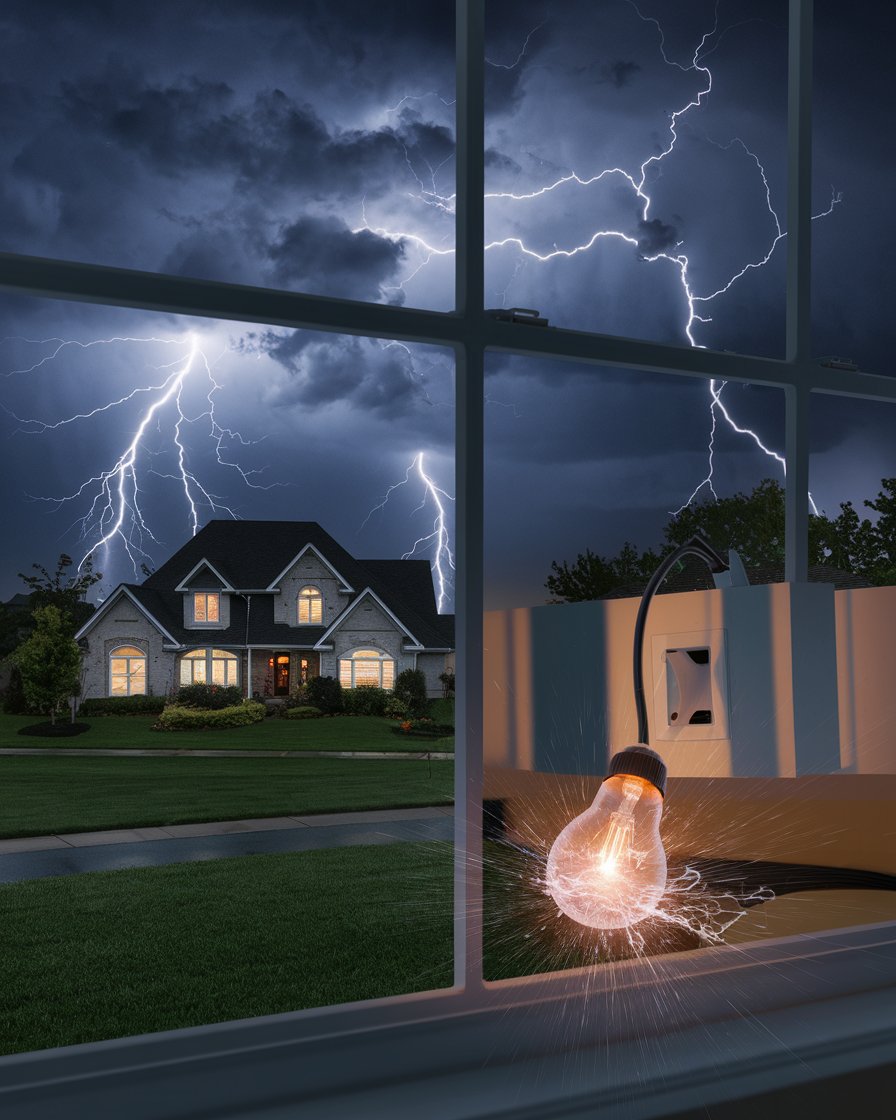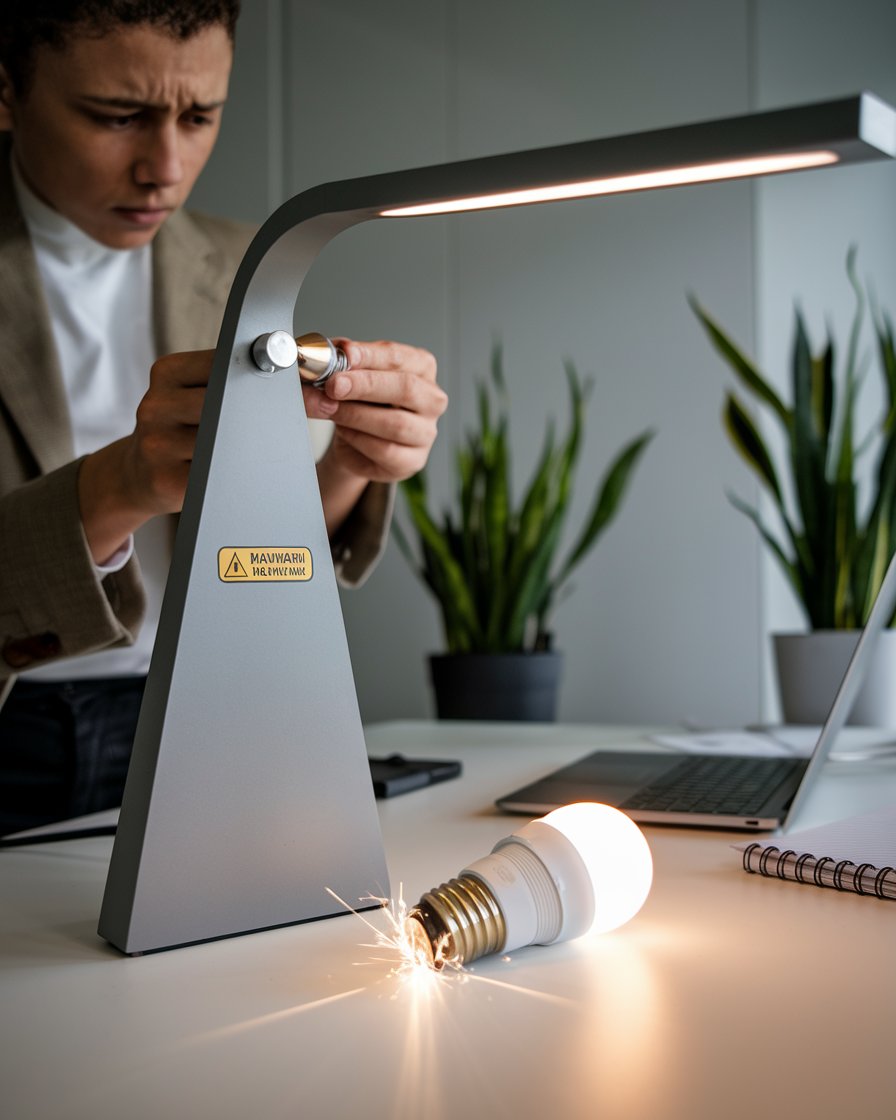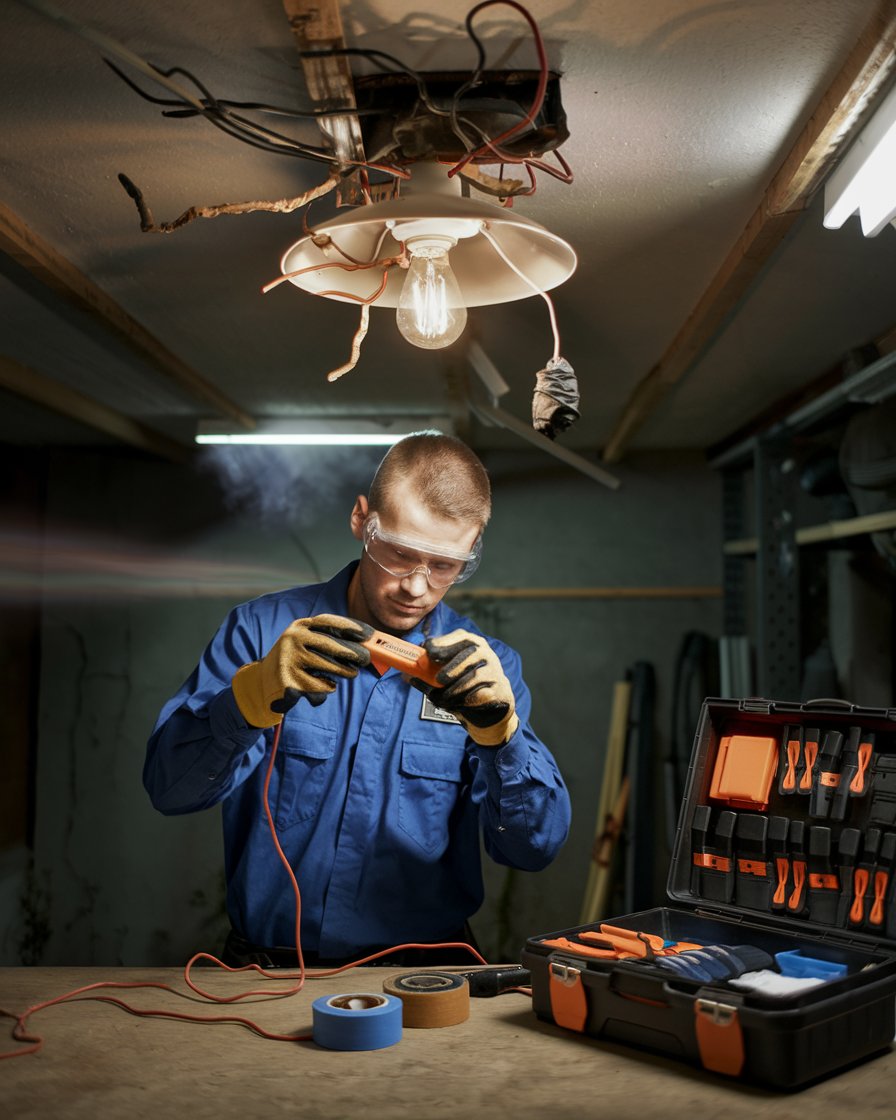Introduction
Light bulbs can explode for various reasons, catching many homeowners by surprise. A common cause is using the wrong wattage for a fixture, which creates excess heat that may lead to a shattered bulb. Sometimes, the insulation at the base of the bulb is inadequate, allowing electrical surges to affect the bulb and cause an explosion. Light bulb explosions can also result from loose connections inside the bulb or socket, making it vital to inspect fixtures regularly to ensure proper insulation and prevent overheating.
Power surges can play a significant role in causing bulbs to explode, especially in older homes with outdated wiring. The surge can cause the electric current inside the bulb to spike, creating a “hot spot” that leads to a breakdown of the bulb’s integrity. Homeowners should use surge protectors and ensure that the light fixture in their home is compatible with the bulb’s wattage to avoid any potential explosions.
Key Takeaways
- Using a light bulb with incorrect wattage can cause excess heat, leading to a bulb explosion.
- Inadequate insulation at the base of a light bulb allows electrical surges, causing the bulb to overheat and shatter.
- Loose connections in the socket can create electrical arcing, resulting in bulb explosions and potential fire hazards.
- Power surges in older homes are a major cause of light bulb explosions, especially with incandescent or halogen bulbs.
- Overheating in enclosed light fixtures without proper ventilation can cause high-wattage bulbs to explode.
- Regular electrical inspections and proper wattage compatibility are essential for preventing dangerous light bulb explosions.
Why Do Light Bulbs Explode? Common Causes and Prevention
When a light bulb explodes, it often catches homeowners off guard. Several factors contribute to this dangerous situation. One common cause is using a bulb that exceeds the recommended wattage for a light fixture, which generates excess heat and can cause the bulb to shatter. Poor insulation around the base of the bulb is another culprit, as it allows electrical surges to enter the light bulb, leading to an explosion. Electrical faults, loose connections in the socket, or even a faulty incandescent bulb can result in an exploding light. Regular inspections of the wiring and ensuring proper wattage ratings for fixtures can help prevent these dangerous occurrences.
5 Reasons What Causes a Light Bulb to Explode
1. Using the Incorrect Wattage
One of the leading causes of light bulbs exploding is exceeding the recommended wattage for the light fixture. When a bulb with too high wattage is used, it generates more heat than the fixture can handle, leading to overheating and a potential explosion.
2. Loose Connections in the Socket
A loose connection between the light bulb and the socket can cause electrical arcing. This instability allows electricity to jump from one point to another, generating excess heat, which may cause the bulb to shatter.
3. Insufficient Insulation at the Base
Light bulbs, particularly incandescent ones, need proper insulation at the base to manage heat flow. Without enough insulation, heat builds up, causing the bulb to overheat and potentially explode, especially when insulation deteriorates over time.
4. Power Surges in the Electrical System
Power surges, particularly in older homes, can send a large amount of electrical current through the bulb. This sudden increase in power can cause the filament to burn out or the bulb to overheat, leading to an explosion.
5. Overheating in Enclosed Fixtures
Enclosed fixtures trap heat, especially when high-wattage bulbs are used. This lack of airflow leads to overheating, causing the bulb to explode due to the extreme temperature inside the fixture.
The Importance of Proper Insulation in Preventing Bulb Explosions
Insufficient insulation at the base of a light bulb can allow electrical surges to enter the bulb, causing it to overheat and explode. This is particularly common in incandescent light bulbs, where the insulation might wear down over time. The base of the bulb plays a critical role in regulating heat and electrical flow. When there’s not enough insulation, the heat has nowhere to escape, and this buildup of energy can lead to a shattered bulb. Homeowners should ensure that their bulbs are properly insulated and regularly inspect older fixtures for signs of wear and tear to prevent potential explosions.
How Using the Wrong Wattage Can Cause Light Bulbs to Explode
Using a light bulb with a higher wattage than recommended for a fixture is a common mistake that can lead to overheating and explosions. When a bulb exceeds the wattage limit, it generates excessive heat, which the fixture and socket may not be designed to handle. Over time, this heat causes the bulb to overheat and potentially explode. Always check the wattage rating on both the bulb and fixture to ensure compatibility. If you notice frequent bulb failures, it may indicate an issue with the wattage or insulation, and a professional electrician may need to inspect the fixture.
Understanding Power Surges and How They Affect Light Bulbs
Power surges are a significant cause of light bulb explosions. When surges occur, they send an excessive amount of electrical current through the bulb, causing the filament inside to overheat and eventually explode. This is particularly common in older homes with outdated wiring, where electrical systems can’t handle sudden voltage increases. Halogen and incandescent light bulbs are more susceptible to power surges than LED lights due to their design. Homeowners should be aware of their home’s electrical system and ensure they have surge protectors installed to avoid this issue. Licensed electricians can help inspect and repair any faulty wiring to prevent dangerous power surges from damaging light bulbs.
Case Study: Power Surges in Older Homes Leading to Light Bulb Explosions
In a case study involving a 30-year-old home in the suburbs of California, the homeowners experienced frequent light bulb explosions. After several incidents, an electrician was called to inspect the property. It was found that the home’s outdated electrical system was prone to power surges, especially during heavy appliance use. These surges were sending excessive electrical current through the bulbs, particularly in enclosed fixtures, leading to repeated explosions. Halogen bulbs in the home were especially vulnerable due to their higher heat output.
The solution involved installing surge protectors throughout the home and upgrading the electrical wiring to better handle modern energy loads. Since these changes were made, no further explosions have occurred, demonstrating the critical role that power surge management and proper electrical maintenance play in preventing light bulb failures.
How Power Surges Damage Light Bulbs and Cause Explosions
Power surges can send a sudden rush of electrical current through a light bulb, overwhelming its filament and causing it to explode. This is especially dangerous in older homes with outdated electrical systems that may not handle these surges well. Even newer LED bulbs, while more resistant, can be affected by sudden power increases. Surge protectors and maintaining proper insulation at the bulb’s base are crucial for preventing such occurrences. Regular inspections of your home’s electrical system, including the light fixtures and wiring, can help protect your bulbs from the effects of power surges.
Preventing Power Surges to Protect Your Home’s Light Bulbs
To prevent power surges from causing light bulbs to explode, it’s important to install surge protectors and ensure that your home’s wiring is up to date. Surge protectors can absorb the excess electrical current before it reaches the bulb, protecting it from damage. In older homes, frequent surges may indicate an underlying electrical issue that needs to be addressed by a licensed electrician. Regular maintenance and upgrading your home’s electrical system can reduce the likelihood of surges, ensuring that your light bulbs last longer without the risk of explosion.
The Role of Socket and Fixture Wattage in Exploding Light Bulbs
The socket and fixture wattage play a crucial role in the safety of a light bulb. When a bulb is placed in a socket with higher wattage requirements than the bulb is rated for, it can lead to overheating and eventually cause the bulb to explode. Over time, the heat builds up, particularly in enclosed fixtures, and without proper ventilation, the bulb can shatter due to the excessive temperature. Halogen bulbs and incandescent bulbs are especially vulnerable to this problem. To avoid such explosions, always check the wattage rating of both the light fixture and the bulb, and ensure they are compatible. If unsure, consult an electrician for proper installation and repair.
Why Socket Compatibility is Essential to Prevent Exploding Bulbs
The socket compatibility with the bulb plays a crucial role in preventing bulb explosions. If the socket is not designed to handle the wattage or type of bulb, such as using a halogen bulb in an unsuitable fixture, it can result in overheating. This often happens when older sockets are paired with modern light bulbs like LEDs, which have different wattage requirements. Ensuring that the socket matches the wattage and type of bulb being used can help prevent issues with overheating and potential explosions. Regular checks and upgrades of fixtures in older homes can ensure safety and longevity of the light bulbs.
How Overheating in Light Fixtures Leads to Bulb Explosions
Overheating in light fixtures is a significant factor in exploding light bulbs. When a bulb is enclosed in a fixture that doesn’t allow proper airflow, the heat generated by the bulb accumulates. This is particularly problematic with high-wattage bulbs, as the heat cannot escape easily, causing the bulb to explode. Ventilation in the fixture and using the correct wattage can prevent this from happening. If your light bulbs frequently overheat, it may be time to replace the fixture with one that allows for better air circulation, reducing the risk of an explosion.
“Electricity is really just organized lightning.” – George Carlin
How Faulty Wiring and Electrical Issues Lead to Bulb Explosions
Faulty wiring is one of the most dangerous causes of light bulb explosions. When there is a loose connection between the wiring and the light bulb socket, it can create electrical arcing, which generates heat and leads to the bulb exploding. Old, damaged, or improperly installed wiring is often the root cause, especially in older homes. Electrical currents that are not correctly managed can cause the base of the bulb to melt, leading to a potential fire hazard. Homeowners should regularly inspect their wiring and ensure that any repairs are done by a licensed electrician to avoid serious issues that could cause an exploding light bulb.
The Dangers of Loose Wiring and Exploding Bulbs
Loose wiring is a major cause of light bulb explosions. When the electrical connection is unstable, it can result in power fluctuations and overheating. These surges of energy can cause the bulb’s filament to break or the base to melt, leading to an explosion. Older homes are particularly at risk due to outdated wiring systems. Homeowners should regularly inspect wiring connections, especially in frequently used fixtures, and have a licensed electrician repair any faulty connections to prevent the risk of explosion and ensure electrical safety.
Why Regular Electrical Inspections Can Prevent Bulb Explosions
Regular electrical inspections are essential for preventing bulb explosions caused by faulty wiring. A licensed electrician can detect and repair issues such as loose connections, worn-out wiring, or overloaded circuits, all of which can lead to electrical surges and overheating. Inspections can also identify potential problems with socket compatibility and wattage mismatches, ensuring that light bulbs operate safely and efficiently. By staying proactive with electrical maintenance, homeowners can prevent dangerous situations like exploding bulbs and keep their home’s lighting fixtures functioning safely.
Conclusion
In conclusion, the causes of a light bulb explosion range from using incorrect wattage to faulty wiring and poor insulation at the bulb base. Whether it’s an incandescent or LED bulb, ensuring the light fixture in your home is compatible with the bulb’s wattage is critical to prevent overheating. Loose connections between the bulb and socket can also create dangerous conditions, leading to electrical surges that may cause the bulb to shatter.
To keep your home safe, regular inspections of light fixtures, proper wattage selection, and surge protection are essential. Removing a damaged or flickering bulb immediately can prevent further issues, and making sure there is enough insulation at the base of the bulb will help avoid overheating. If you’re looking for long-term solutions, consider upgrading older light fixtures and having a licensed electrician inspect any faulty wiring that may contribute to exploding bulbs.












